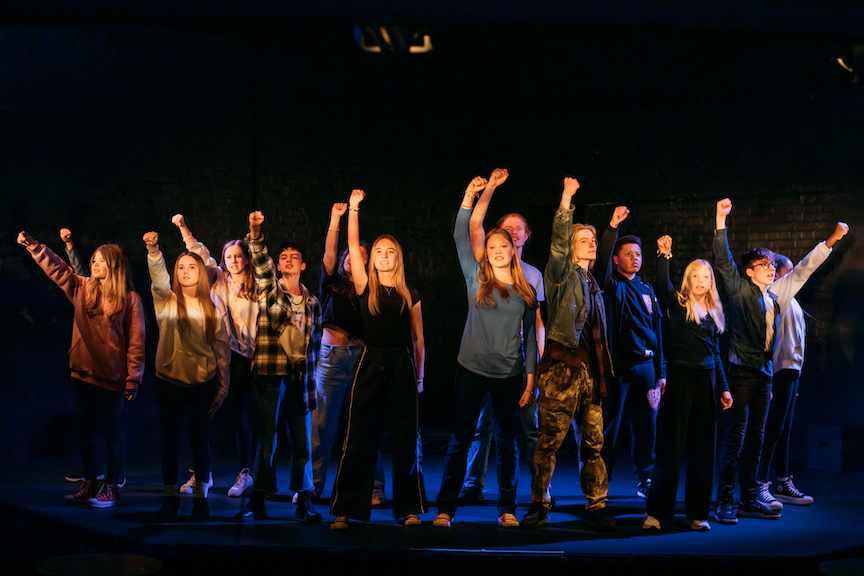The Oral History Unit and Collective’s Foodbank Histories and Mutual Aid Oral History projects address the social and historical justice issues of Food Poverty. The projects have reached completion, but the issues remain, and the interviews and findings continue to influence ongoing research, public awareness and engagement initiatives. Here Unit Associate Researcher, Silvie Fisch reviews Live Youth Theatre‘s new production of Fed Up.
Live Theatre decided pre-pandemic to make food poverty a long-term focus for young people at their youth theatre. Interviews from both projects were used in the development of two shows and connected community outreach programmes, first in 2019, now once again in 2024.
The name remained the same: “Fed Up!” Parts from the first show appear in the second, but Fed Up! 2 is much longer, 18 scenes in total, and even more passionate than its predecessor. It investigates how food poverty affects young people in the North East of England and beyond. As part of their research, the team listened to and discussed excerpts from the interviews we had conducted with Foodbank and Mutual Aid service users.
They took this research seriously and worked on the materials for several months, supported by Director Paul James, Assistant Director Lauren Hawkes and dramaturg Tracy Gillman. They knew the harsh realities people endure are very different to what they have so far experienced in their own young lives. Several scenes begin with “Once upon a time…”, creating a distance between the actors and the narratives of reality they bring to the stage. But it was obvious and fascinating to see how listening to the narratives of lived experiences we recorded helped them understand what it’s really like when you can’t make ends meet and how it fuelled their anger against injustice.
The result is a fast paced, nuanced rendering of people’s feelings, thoughts and experiences into short scenes, bearing witness through storytelling of individual sufferings and within the overarching political framework.
Passionate, sometimes poetic monologues and dramatic dialogues reveal the consequences of low paid, precarious employment and an inadequate, punitive benefit system. “Are you going to wait in the queue like you see them on the telly, like you’ve seen in that film? Is that really us?” These ‘family stories’ are probably the most moving scenes in the show.

Managing everyday living on tight budgets has become almost impossible, not just for the poorest families (who had an average income 59% below the poverty line in recent years!). In 2021/22 two thirds of working-age adults in poverty lived in a household where someone was in work (Joseph Rowntree Foundation, UK Poverty 2024 Report).
People don’t expect luxuries, just the basic necessities. Enough money to put food on the table, pay the electric bill and buy new school shoes for their children. To emphasise this, we get to hear a collage of original audio from an interview with the single mother of toddler twins.
“I worry that I’m going to wake up and the electric is going to be off … I don’t really like asking for help of foodbanks and things like that. I’m thinking, maybe’s if I just don’t get that… you know, I’ve put off getting me hair cut which only costs about nine pound … I can’t afford a proper pair of boots… It’s one thing for myself but to not be able to provide for your children that makes you feel like a failure. It does … Sometimes if they leave bits I’ll pick at that, then I’ll have some toast or a soup or a sandwich or something and that’s it, it’s whatever’s there, whatever’s left, if I like it or not, that’s what it is… The kids have never gone without.”
Young people carry the heaviest burden of the social and economic inequalities between communities. A staggering 47.5% of children in the Byker area of Newcastle were living in relative poverty in 2020/2021(Newcastle upon Tyne City Profile). And their prospects are grim. On average, children who receive free school meals are less than half as likely to receive five good GCSEs.
The ridiculing portrayals of the “self-serving, self-indulgent, self-righteous” politicians by the young actors are hilarious, but the message is clear: poverty is a political choice. And they refer to the damning remarks of Philip Alston and Olivier De Schutter, the UN’s special rapporteurs on extreme poverty and human rights, who repeatedly accused the UK government of the systematic immiseration of a significant part of the British population (see for example the Report of the Special Rapporteur on extreme poverty and human rights 2019).
“Remember the past? How we either learn from it or are forced to repeat it.” This most striking monologue, already a highlight of Fed Up! 1, has particular resonances for a region which experienced unprecedented rise in poverty in the 1980s, leaving it with poverty levels that are still around 50% higher than they were in the 1970s. Generations of people grow up and live their lives severely disadvantaged. “I was born a poor child and I will die a poor, old man”, says one of the characters, a quote taken from one of the interviews.
The show ends with one crucial question for the audience:
“We are Fed up.
Are you?”
“Fed Up!” on tour:
- Newcastle United Foundation, NUCASTLE, Diana Street, Newcastle upon Tyne, NE4 6BQ
Thursday 25th April, 7pm
- Newcastle Cathedral, St. Nicholas Sq, Newcastle upon Tyne, NE1 1PF
Thursday 23rd May, 7.30pm
- InterTwinned European Youth Arts Festival – Gelsenkirchen, Germany
Saturday 21st September
Literature
Atkinson-Phillips A, Fisch S, Hepworth J. Experiences of place and loss at Newcastle West End Foodbank. North East History 2020, 51, 163-179.
Hepworth J, Atkinson-Phillips A, Fisch S, Smith G. “I was not aware of the hardship”: Foodbank Histories from North-East England. Public History Review 2019, 26, 1-25.
